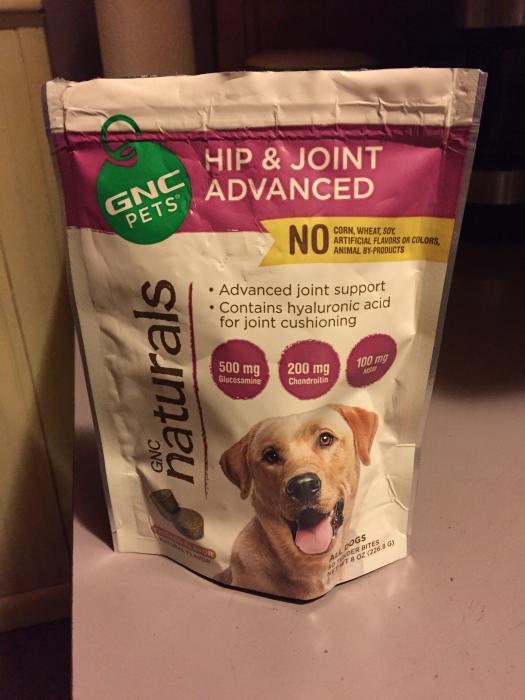Dog health question
I've had several big dogs whose back ends gave out towards the end. (Or the end came when their back ends gave out, to be more accurate.) One suggestion: Get him trained on using ramps now, while he's young and nimble. Make it a fun game. When he gets older, you will probably need a portable ramp to get him into the car, and maybe another ramp to get him up the stairs to the house. When he is old and wobbly, he may resist this training, and hoisting him will kill your back.
My German Shepherd also sat sloppy, but her issue was arthritis in the lower spine. Pretty much the same end result, I think.
11 year old. I just want 5 or 6 good years.
When our dog was eight years old she suddenly started having trouble with her hips/hind end. The day after a hike she could hardly get around. She sat just like you described - with her legs splayed out behind her body. Our vet at the time insisted it was arthritis. I didn’t think so and took our dog to Dr. Stacks for a second opinion. He diagnosed a back injury, prescribed two kinds of pain meds and after about two weeks our dog was back to normal. Sometimes getting a second opinion can really make a difference. Our dog weighs about 65 lbs - medium size and very active.
The thing is, there's nothing to do now. He's functionally fine. And never complains, though I know dogs can hide pain. Let's say an x ray shows it, what am I gonna do, have surgery on a dog that moves fine and isn't complaining?
I've read comments on breeder forums to the effect that may dogs can have the sloppy sit/lay thing without ever developing problems. Who knows.
If your pooch is not in pain, I wouldn’t do anything. You could give him/her Glucosamine/Chondrotin supplements as a precautionary measure.
We started it, thanks.
Sweetsnuggles said:
If your pooch is not in pain, I wouldn’t do anything. You could give him/her Glucosamine/Chondrotin supplements as a precautionary measure.
Our old man, RIP, dear sir, was a big guy and also suffered from dysplasia. Although no cure, researching and asking other big dog owners led me to bone broth. It soothed his aches and pains and made him more comfortable and active. There were times that Mr. Kibbegirl and our oldest had to carry him upstairs because his back legs pained him but those episodes became less frequent when I began adding the bone broth/marrow. There are tons of recipes for it online (very simple) but if you don't have time to simmer a pot for hours and hours, there is the powered form as well.
I also agree with the Glucosamine, which you can buy in bulk at Costco. (Good for people, too! LOL!) FYI...bone marrow also includes glucosamine.
There are many reasons that experts say bone broth is beneficial for dogs – particularly aging or sick canines – here are the top reasons:
- Supports your dog's immune system.
- Maintains healthy digestion & soothes tummy issues.
- A natural source of glucosamine and chondroitin, both of which are excellent for bones and joints.
Thanks for all the suggestions. I just want to be clear that he's fine now. I'm just trying to figure out if something is coming. When you look up "symptoms of HD", his funny sitting and laying habits its are not on the list. On the other hand, if you look up "sloppy" sitting, its sometimes associated with HD and sometimes its nothing.
Even though he is fine now, dietary supplements will have a better long term effect if used prior to issues to keep them from appearing sooner, or lessening their effect when they eventually show up. If you wait until he has symptoms they can still work, but not as well since they’re not miracle drugs. With any of the larger breeds that are prone to hip issues, especially if you don’t know the lineage, starting dietary treatments sooner rather than waiting for symptoms is usually a good idea
Will do. I know his lineage. Except for 1/8 sheperd, none of his contributor are on the A list of HD sufferers but on the other hand, its not limited to particular breeds and big dogs are more prone to it than small.
What I meant by lineage was that when we got our rottie we got one where her parents and grandparents had a clean bill of health in regards to hip dysphasia. She died young from cancer, but while being treated the vet mentioned that on the x-ray her hips looked better than any other rottie of the same age that he’d seen in awhile
Agree. Even if she is a small percentage of shepherd, she's prone. We had a full bred Akita and did our homework and knew about their issues with HD. They are same as Rotti's, German shepherds, Labs and Golden R's. Having a mixed breed cuts it down drastically but doesn't prevent it.
spontaneous said:
Even though he is fine now, dietary supplements will have a better long term effect if used prior to issues to keep them from appearing sooner, or lessening their effect when they eventually show up. If you wait until he has symptoms they can still work, but not as well since they’re not miracle drugs. With any of the larger breeds that are prone to hip issues, especially if you don’t know the lineage, starting dietary treatments sooner rather than waiting for symptoms is usually a good idea
Featured Events
-
Stephen Whitty Presents - Hometown Movie Stars: The Celebrated Actors Of CHS
May 6, 2024 at 7:00pm
-
'Beethoven's Wrong Note: A Steampunk Opera'
May 12, 2024 at 2:00pm


















So we adopted a big mutt, nearly 100 lbs, from a shelter last year. He's 4.
The good, and maybe dispositive, news re my concern is that he walks and runs just fine, to me eye. He not only runs well (although not frequently) but is quite agile for a big dog. When involved in chases with other dogs, he can stop short and zig zag with the best of them.
What concerns me is that despite his apparent good mobility, he has certain traits associated with hip dysplasia. First, he usually "sloppy" sits and lays. Its very rare for him to sit or lay with his hind legs tucked in neatly and his "feet" pressed to the floor. His legs are always splayed out in various ways. Second, the vet noticed and repeatedly comments that his hind legs are too straight when standing. His knees are barely bent if at all when he stands.
Any thoughts/experiences?